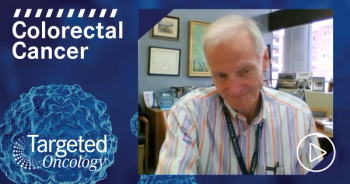
Future Developments & Screening Recommendations in CRC
Cathy Eng, MD, FACP:So future developments in colorectal cancer: I think currently, and moving forward, we’re really trying to think not only of colon cancer as a very common cancer, which we know it already is, but how we can really characterize it further. I think we’re finding more, basically, smaller molecular subsets. So as I mentioned earlier,HER2[human epidermal growth factor receptor 2] amplification is of great interest and there’s actually a clinical trial called SWOG 1613. And, once again,HER2amplification is extremely rare. It is seen in less than 5% of patients. But SWOG 1613 is a randomized phase II study taking into account patients that haveHER2amplification.
We’re trying to determine if that is actually better than a standard of care, which, for a second- or third-line setting would often include anti-EGFR therapy. So that would be a very good trial to participate in, and it also allows crossover from the standard of care arm into the investigational arm, if you end up randomized to the control arm.
Other interests such as theBRAFmutation: As we know, that has received quite a lot of interest over the past couple of years, largely due to SWOG 1406, which demonstrated that there is benefit targeting not only theBRAFmutation but incorporating anti-EGFR therapy as well.
There are other trials. Specifically, we know of the BEACON study, which is an ongoing phase III trial. I believe the enrollment has nearly completed or has been completed. But we don’t know the final results. We do know of the first 30 patients that went on to the study. There was significant response. And that resulted in a rapid FDA approval in August of this past year. So that’s of great interest.
I think we’re going to find more molecular subsets that we can work with our patients in trying to really target their tumor type. Our biggest nemesis is still the standardRAS-mutated MSI [microsatellite instability]-stable patient population. And as a result, we continue to find clinical trials that we can enroll our patients in. At the end of the day, as long as the patient’s on some type of therapy, as long as their laboratory tests are reasonable, as long they’re feeling well, we will continue to treat them regardless, to improve their overall survival. And I think that’s why you’re seeing patients for which the median survival is now expanding past 3 years.
I have patients who have been under my care with metastatic disease for whom we’ve incorporated radiation, potentially liver resection periodically, or lung resection periodically. I have some patients that are out to 9 or 10 years with metastatic disease. And so, it’s very positive. I even have patients that have had a history of brain metastasis and are still alive 5 to 10 years later on.
So I think that we really need to continue to work with these individuals, and make sure that we’re addressing any toxicities they may be having early on so they can move on to the next line of therapy and feel well if necessary.
The other thing I think that is extremely exciting, granted it’s very rare, is the NTRK fusion. There are drugs to target that, and that’s recently been FDA approved. And we really need to encourage individuals to test their patients for all these various molecular markers and try to help us characterize the tumor. So I think that’s what is exciting at this time and that’s how the field is moving forward.
I would like to add that March is National Colorectal Cancer Awareness Month, and we really want to encourage individuals to remember to get screened, now starting at the age of 45. And if you have any potential symptoms, go talk to your primary care physician. Don’t presume it’s a hemorrhoid. I hear that so often. Speak to your primary care physician if you’re not feeling well and investigate whether you have potential colorectal carcinoma. Because, as I mentioned earlier, young individuals are now presenting with this disease much earlier on, and a lot of times they don’t have a primary care physician. They had felt healthy throughout their whole life or they presumed it was due to a hemorrhoid. So we do encourage patients to get screened and really investigate your symptoms, and make sure that you encourage your family members to do so as well.
Transcript edited for clarity.
Case: A 38-year Old Woman WithKRAS-Mutated mCRC
Initial presentation
- A 38-year old woman was referred to gastroenterology after experiencing several bouts of bloody diarrhea
- PMH: unremarkable
- PE: unremarkable
Clinical workup
- Colonoscopy: suspicious sigmoid mass, partial obstruction
- Biopsy: poorly differentiated adenocarcinoma
- Imaging: CT scan of the chest/abdomen/pelvis revealed multiple small bilateral liver metastases
- Molecular testing on tissue biopsy:
- Positive forKRASexon 2 codon 12 mutation
- Negative forNRAS,BRAF
- Microsatellite-stable
- Diagnosis: stage IV colorectal cancer
- ECOG PS 0
Treatment
- She underwent laparoscopic sigmoid resection
- She was initiated on treatment with FOLFOX + bevacizumab; well-tolerated
- Follow-up imaging at 3 and 6 months showed a partial response



















